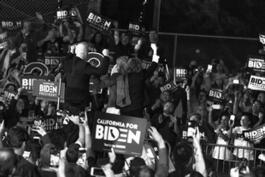Most Remain Suspicious of Politicians Who Play the ‘Race Card’
Joe Biden triggered a backlash last week when he said blacks who choose President Trump over him aren’t really black, but most voters continue to believe politicians only play the so-called ‘race card’ to win, not to fix minority problems. Still, they see Democrats like Biden as a bigger help than Republicans.
A new Rasmussen Reports national telephone and online survey finds that only 19% of Likely U.S. Voters think most politicians raise racial issues to address real problems. Sixty-nine percent (69%) say they raise racial issues just to be elected, although that’s down from a high of 78% when we first asked this question six years ago. Thirteen percent (13%) are undecided. (To see survey question wording, click here.)
Unchanged in recent years, however, are the 33% who feel political candidates discuss racial issues too much. Just as many (34%) say they discuss them too little, while 24% believe the level of discussion is about right.
Forty-seven percent (47%) of voters think Democrats have done more historically for black Americans than Republicans have, compared to 28% who feel the GOP has done more. Nineteen percent (19%) think both parties have been about the same.
Blacks (60%) who historically vote overwhelmingly for Democratic candidates are much more likely than whites (44%) and other minorities (49%) to believe the Democratic Party has done more for them.
(Want a free daily e-mail update? If it's in the news, it's in our polls). Rasmussen Reports updates are also available on Twitter or Facebook.
The survey of 1,000 Likely Voters was conducted May 24-25, 2020 by Rasmussen Reports. The margin of sampling error is +/- 3 percentage points with a 95% level of confidence. Field work for all Rasmussen Reports surveys is conducted by Pulse Opinion Research, LLC. See methodology.
Forty-nine percent (49%) of Democrats think those who voted for Trump are racist. But then one-in-three Democrats think it’s racism any time a white politician criticizes a politician of color.
Most voters in nearly every demographic category think the majority of politicians talk racial issues just to get elected, not to solve problems.
Whites (71%) are more likely than blacks (63%) and other minority voters (65%) to think most politicians play the race card just to win. Blacks feel much more strongly that racial issues are discussed too little by political candidates.
Even among voters who think political candidates discuss racial issues too little, 60% believe most of them just raise those issues to get elected, not solve problems.
Fifty-five percent (55%) of Republicans say their party has done more for black Americans, but that compares to 75% of Democrats who feel they’ve done more. Among unaffiliated voters, 18% say the GOP has done more; 42% credit the Democrats more, while 26% think they’ve both done about the same.
If Biden ends up as the Democrats’ presidential nominee, most voters in his party think he should choose a woman or person of color as his running mate, but there’s no clear favorite.
A year ago, before the coronavirus changed the equation, when unemployment for black Americans was at an historic low, voters said Trump, a Republican, had been better for young blacks than his Democratic predecessor Barack Obama. But voters also felt the government could do more and didn’t think Trump’s rotten relationship with black members of Congress helped.
Additional information from this survey and a full demographic breakdown are available to Platinum Members only.
Please sign up for the Rasmussen Reports daily e-mail update (it's free) or follow us on Facebook. Let us keep you up to date with the latest public opinion news.
The survey of 1,000 Likely Voters was conducted May 24-25, 2020 by Rasmussen Reports. The margin of sampling error is +/- 3 percentage points with a 95% level of confidence. Field work for all Rasmussen Reports surveys is conducted by Pulse Opinion Research, LLC. See methodology.
Rasmussen Reports is a media company specializing in the collection, publication and distribution of public opinion information.
We conduct public opinion polls on a variety of topics to inform our audience on events in the news and other topics of interest. To ensure editorial control and independence, we pay for the polls ourselves and generate revenue through the sale of subscriptions, sponsorships, and advertising. Nightly polling on politics, business and lifestyle topics provides the content to update the Rasmussen Reports web site many times each day. If it's in the news, it's in our polls. Additionally, the data drives a daily update newsletter and various media outlets across the country.
Some information, including the Rasmussen Reports daily Presidential Tracking Poll and commentaries are available for free to the general public. Subscriptions are available for $4.95 a month or 34.95 a year that provide subscribers with exclusive access to more than 20 stories per week on upcoming elections, consumer confidence, and issues that affect us all. For those who are really into the numbers, Platinum Members can review demographic crosstabs and a full history of our data.
To learn more about our methodology, click here.





